Capitol Reflections: 2024 Session, Issue 10
By: Idaho Farm Bureau Governmental Affairs
Timid men prefer the calm of despotism to the tempestuous sea of liberty. - Thomas Jefferson
H404 Signed by Governor
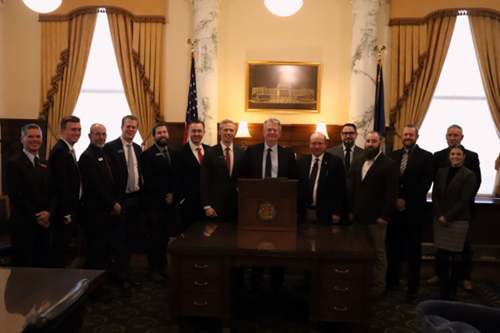 H404 was signed into law on Monday by Governor Brad Little. IFBF Governmental Affairs Representative Dexton Lake was able to participate in the signing ceremony as pictured. This law limits the ability for entities to access records showing where wildlife exists on public or private land. Wildlife advocacy groups utilize these tools to strategize methods that prevent hunting, such as chasing animals away and harassing producers. The law does allow for agencies to release information that would show broad areas of wildlife presence, but not precise locations. They can also selectively provide specific location dependent on who is asking. IFBF appreciates the legislature’s support in protecting private property owners from harassment and trespassing.
H404 was signed into law on Monday by Governor Brad Little. IFBF Governmental Affairs Representative Dexton Lake was able to participate in the signing ceremony as pictured. This law limits the ability for entities to access records showing where wildlife exists on public or private land. Wildlife advocacy groups utilize these tools to strategize methods that prevent hunting, such as chasing animals away and harassing producers. The law does allow for agencies to release information that would show broad areas of wildlife presence, but not precise locations. They can also selectively provide specific location dependent on who is asking. IFBF appreciates the legislature’s support in protecting private property owners from harassment and trespassing.
Quagga Mussel Bills Advance
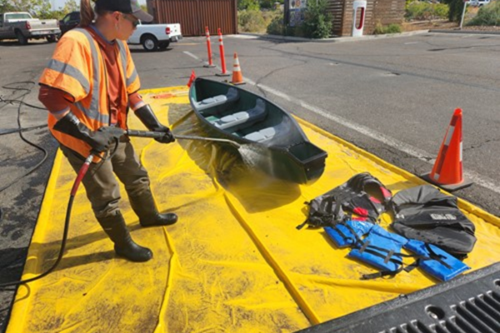 A couple of bills that would provide additional resources to address the threat of quagga mussels and other invasive aquatic species have advanced through the legislative process.
A couple of bills that would provide additional resources to address the threat of quagga mussels and other invasive aquatic species have advanced through the legislative process.
S1322 is a bill that would amend state law to further define "conveyance" as "retail or wholesale products, or water known to carry or have a reasonable possibility of carrying invasive species." The bill also requires immediate removal of vegetation and water drainage from conveyances while also mandating nonresidents to carry an invasive species sticker and to be inspected at a watercraft inspection station prior to launch.
Additionally, S1322 allows for up to twenty percent of the invasive species fund's annual revenue being made available by ISDA to counties, cities, or other local entities for equipment and supply costs necessary for the operation of watercraft inspection stations. The bill recently passed the House Resources Committee and will soon be heard and voted on by the whole House.
The other bill is S1372, a supplemental appropriations bill for ISDA that includes $6.6 million to continue the state’s efforts to combat invasive quagga mussels in the Snake River. These funds will support the state’s ongoing prevention and monitoring of invasive species and future preparedness for rapid response. S1372 has passed the legislature and is being sent to the Governor for his signature.
IFBF policy #71 supports adequate state funding and resources for inspections of all watercraft and other vessels to prevent the spread and infestation of any non-native aquatic species in Idaho waters. Farm Bureau appreciates the legislature’s work on both of these bills and looks forward to seeing them implemented to further protect the state’s water resources. IFBF supports S1322 and S1372.
State Grazing Permit Bill Nears Finish Line
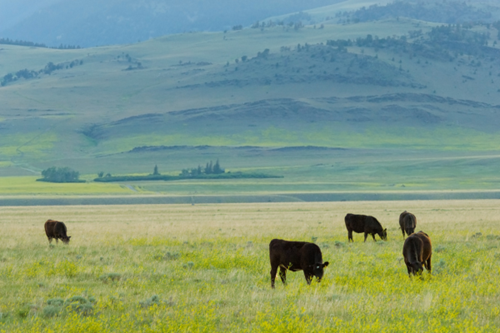 Earlier this week, S1243 was approved in the House on a vote of 66-2. S1243 was already approved in the Senate and is now awaiting the signature of Governor Little.
Earlier this week, S1243 was approved in the House on a vote of 66-2. S1243 was already approved in the Senate and is now awaiting the signature of Governor Little.
S1243 provides an opportunity for a federal grazing permit, which is recognized in Idaho law as a property right, to be converted to a state grazing permit following an exchange of land between the federal government and the state. This is important to ensure Idaho citizens are not unjustly disadvantaged by a land exchange.
The ability to renew the permit, as long as the rancher follows the rules of the permit, is what gives a federal grazing permit value. In fact, banks use federal grazing permits as collateral against loans due to this assurance of future use.
Unfortunately, in the past, when a land exchange took place, the state did not have a mechanism to allow those legally recognized, private rights to continue following the exchange. S1243 rectifies that injustice and ensures that Idaho citizen’s property interests are protected following an exchange.
Under S1243, the rules, terms and conditions are exactly the same for a state grazing permit as a state grazing lease. The state would also receive the same annual payment from a state grazing permit as a lease. The only difference is that a state grazing permit will be renewed at the end of the term, just as it did when the land was managed by the federal agencies, so long as the rules are complied with.
S1243 provides fairness and equity to both the state of Idaho and the ranchers who have no control over, nor real say in the process of a state/federal land exchange.
Idaho Farm Bureau policy #45 states in part: “we support legislation to ensure that none of the valid existing private rights are lost in any land exchange between Idaho and the federal government.”
IFBF appreciates the overwhelming, bipartisan support from both the House and Senate for S1243 and looks forward to having Governor Little sign the bill shortly. IFBF supports S1243.
Ag Land Protection Bill to be Amended
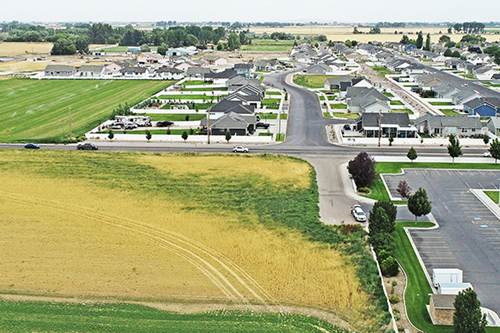 On Tuesday, the Senate Local Government Committee heard H608 regarding agricultural protection areas (APAs). The committee members asked many thoughtful questions and heard from many farmers, seed companies, agribusinesses, and even some elected officials that testified in favor of the bill. The Idaho Association of Counties was the only entity to testify in opposition to the bill, expressing their concern about the eminent domain provision and requesting carveout for public easements for highways. Farm Bureau and Rep. Andrus expressed our concern that an amendment would remove any incentive for landowners to consider an APA.
On Tuesday, the Senate Local Government Committee heard H608 regarding agricultural protection areas (APAs). The committee members asked many thoughtful questions and heard from many farmers, seed companies, agribusinesses, and even some elected officials that testified in favor of the bill. The Idaho Association of Counties was the only entity to testify in opposition to the bill, expressing their concern about the eminent domain provision and requesting carveout for public easements for highways. Farm Bureau and Rep. Andrus expressed our concern that an amendment would remove any incentive for landowners to consider an APA.
After deliberations, Sen. Grow made a motion to send the bill to the Senate Floor with a do-pass recommendation. Sen. Schroeder made a substitute motion to send the bill to the amending order to carve out existing public easements for roadways. Unfortunately, the substitute motion passed the committee on a 6-3 vote. We are now working on an acceptable amendment that will meet the needs of county government while still serving as a benefit to landowners.
We thank Senators Grow, Cook, and Adams for their votes in committee that sided with Farm Bureau and the many farmers that testified in favor of the bill. Though we are confident that we can find an acceptable path forward, we still feel that the original text of H608 accomplished the mutual goals and needs of all stakeholders. IFBF supports H608.
Depredation Bills Updates
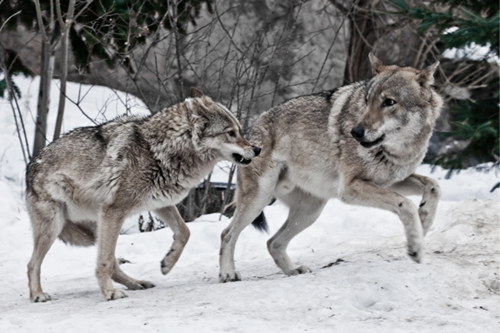 H592 passed the Senate on Tuesday with a 24-10-1 vote. This bill creates $225,000 in funds for prevention and compensation of losses due to grizzly bears and wolves. Idaho Farm Bureau appreciates the legislature in passing funding that will aid producers who are dealing with these apex predators. Notably, IFBF appreciates Representative Jerald Raymond (R-Menan) and Mark Sauter (R-Sandpoint) for sponsoring the bill as well Senator Van Burtenshaw (R-Terreton) for carrying the bill in the Senate. Additionally, Representative Sonia Galviz (D-Boise) was the originator of the idea and we appreciate her collaborative efforts with producers, IFBF, and the sponsors to make sure this bill could become a reality for Idaho agriculture.
H592 passed the Senate on Tuesday with a 24-10-1 vote. This bill creates $225,000 in funds for prevention and compensation of losses due to grizzly bears and wolves. Idaho Farm Bureau appreciates the legislature in passing funding that will aid producers who are dealing with these apex predators. Notably, IFBF appreciates Representative Jerald Raymond (R-Menan) and Mark Sauter (R-Sandpoint) for sponsoring the bill as well Senator Van Burtenshaw (R-Terreton) for carrying the bill in the Senate. Additionally, Representative Sonia Galviz (D-Boise) was the originator of the idea and we appreciate her collaborative efforts with producers, IFBF, and the sponsors to make sure this bill could become a reality for Idaho agriculture.
H612, sponsored by Representative Judy Boyle (R-Midvale) and Senator Mark Harris (R-Soda Springs), having passed unanimously out of the House went to the Senate Committee on Resources & Environment. It passed out of that committee on Monday unanimously with a do-pass recommendation and now heads to the Senate floor. This bill opens the statute relating to the Wolf Depredation Control Board to allow that board to pay for losses when there are high numbers of livestock that don’t come home from wolf depredation areas. IFBF Policy # 72.2 states, “we support establishing a new state depredation fund that compensates large carnivore (wolf and grizzly) depredations.” IFBF feels H612 helps accomplish this policy. IFBF supports H612. More information can be found in Issue 7 of Capitol Reflections.
Fencing Bill Introduced
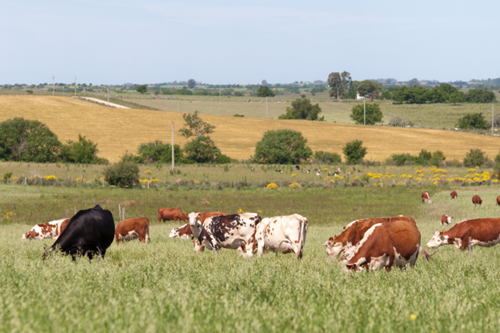 Most livestock producers are good neighbors. When their animals get out into the neighbor’s grain field or adjoining pasture, they get a phone call that the fence is down and immediately come get the cows in and fix the fence. However, from time to time there is a livestock producer who refuses to come get their animals in a timely manner or just lets their cattle roam regardless of whose property it is. If the person whose land is being trespassed calls the local sheriff, there is not a whole lot the sheriff can do to penalize the livestock owner. To address this, Representative Kevin Andrus (R-Lava Hot Springs) introduced H712 which accomplishes the following:
Most livestock producers are good neighbors. When their animals get out into the neighbor’s grain field or adjoining pasture, they get a phone call that the fence is down and immediately come get the cows in and fix the fence. However, from time to time there is a livestock producer who refuses to come get their animals in a timely manner or just lets their cattle roam regardless of whose property it is. If the person whose land is being trespassed calls the local sheriff, there is not a whole lot the sheriff can do to penalize the livestock owner. To address this, Representative Kevin Andrus (R-Lava Hot Springs) introduced H712 which accomplishes the following:
- Shortens the timeframe for producers to get their livestock from five to three days.
- Increases the fee per head for feeding and care, if they have been relocated and taken care of, from $2.00 to $5.00 for cattle and horses then $0.75 to $2.00 for all other livestock. This will only be charged after the sheriff or brand inspector has notified the livestock producer the livestock have been taken up.
- If a livestock producer willfully allows their livestock to roam after being notified, there is a new fine imposed. $250 for the first-time offense, $500 for the second if it is within five years of the first, and $750 for subsequent offenses within five years and subject to a misdemeanor.
- Lastly, if stray livestock cause damage to a cultivated field, then the owner can be subjected to a fine of up to $10.00 per head of cattle and horses and a fine of up to $4.00 for other types of livestock. Again, this is after the producer has been notified and the three days have passed.
The bill was presenting to the House Committee on Agricultural Affairs where it unanimously moved to the floor with a do-pass recommendation. IFBF supports H712 and hope it will deter bad actors from abusing land in possession by others.
HJM011 Fails on Tie Vote
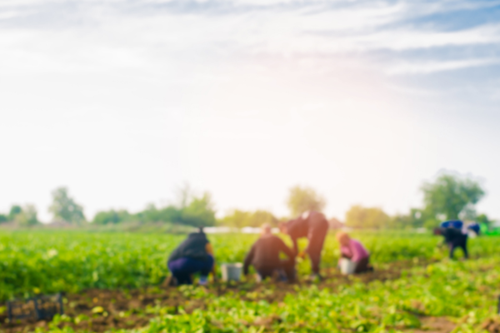 HJM011 was a replacement Joint Memorial to HJM008, both of which IFBF opposed. IFBF tried to provide rewritten language that would not place the burden of human and drug trafficking because of illegal immigration on Idaho industry trying to fill labor needs, but the bill sponsors opted to not revise the language. HJM011 also kept the language that President Biden must be impeached, and H.R.2 and the Secure Border Act of 2023 pass before Congress can ‘contemplate’ a mechanism for processing immigrants into the country.
HJM011 was a replacement Joint Memorial to HJM008, both of which IFBF opposed. IFBF tried to provide rewritten language that would not place the burden of human and drug trafficking because of illegal immigration on Idaho industry trying to fill labor needs, but the bill sponsors opted to not revise the language. HJM011 also kept the language that President Biden must be impeached, and H.R.2 and the Secure Border Act of 2023 pass before Congress can ‘contemplate’ a mechanism for processing immigrants into the country.
The heated debate focused on how the H2A program does not allow for year-round labor and how, with all housing and transportation requirements, an average wage for H2A is well above $20.00 an hour. It additionally focused on minimal border security and enforcement being the true problem. Ultimately, the vote failed on a tie vote. IFBF appreciates those who voted in opposition.
IFBF looks forward to advocating for SJM102 which states Congress and the President have failed in their duties to implement an immigration policy that keeps America safe while meeting labor needs. It explicitly calls for tighter border security, an effective guest worker program that accounts for year-round agriculture and other industries and prohibits amnesty to those currently in the country without legal status. Idaho Farm Bureau believes this approach addresses the current conflicts occurring at the southern border while accounting for the labor needs of Idaho. IFBF supports SJM102.
------------------------------------------------------------------------------------
Resources Available to Follow During Session:
Legislative Website Homepage: HERE
2024 Legislative Session Bill Center: HERE
List of Senate Committee Assignments: HERE
List of House Committee Assignments: HERE
Current Senate Committee Agendas: HERE
Current House Committee Agendas: HERE
Watch Committee Meetings and Floor Sessions Live: HERE
Governor’s Bill Action and Legislative Communications: HERE
Still can't find what you are looking for? Find by topic:
- Achievement Award (YF&R)
- Actions Alerts
- Advocacy
- Ag Ambassadors
- American Farm Bureau
- American Farm Bureau Policy Book
- Archive Photos
- Articles
- Board of Directors
- Calendar - State/District
- Calendar - County
- Capitol Reflections
- Collegiate Chapters
- Committee Application Form
- Commodities
- Convention Annual
- County Presidents & Board Information
- County Resource Page
- Delegate Form
- Discount Programs
- Discussion Meet
- Discussion Meet - High School
- Education Programs
- Events
- Excellence Award (YF&R)
- Expense Voucher
- Flickr
- Gem State Producer
- High School Discussion Meet
- High School Speech Contest
- Hope in Idaho Ag
- House of Delegates Credentials Form
- IFBF Board of Directors
- IFBF Policy Book
- IFBF Staff
- Insurance
- Legislative Action Program
- Legislative Issues
- Library
- MAC Trailer
- Magazines
- Map My Benefits
- Member Benefits
- Member Discount
- Membership Application
- Mission Statement
- Moving Agriculture to the Classroom
- Newsletter Sign up
- News Releases
- News Room
- Open Range Law
